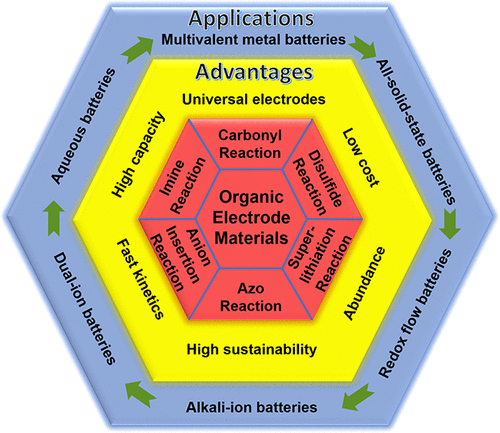当前位置:
X-MOL 学术
›
ACS Appl. Mater. Interfaces
›
论文详情
Our official English website, www.x-mol.net, welcomes your
feedback! (Note: you will need to create a separate account there.)
Organic Electrode Materials for Metal Ion Batteries.
ACS Applied Materials & Interfaces ( IF 8.3 ) Pub Date : 2020-01-22 , DOI: 10.1021/acsami.9b20384
John J Shea 1 , Chao Luo 1
ACS Applied Materials & Interfaces ( IF 8.3 ) Pub Date : 2020-01-22 , DOI: 10.1021/acsami.9b20384
John J Shea 1 , Chao Luo 1
Affiliation

|
Organic and polymer materials have been extensively investigated as electrode materials for rechargeable batteries because of the low cost, abundance, environmental benignity, and high sustainability. To date, organic electrode materials have been applied in a large variety of energy storage devices, including nonaqueous Li-ion, Na-ion, K-ion, dual-ion, multivalent-metal, aqueous, all-solid-state, and redox flow batteries, because of the universal properties of organic electrode materials. Moreover, some organic materials enable the batteries to be operated in the extreme conditions, such as a wide temperature range (-70 to 150 °C), a wide pH range, and in the presence of O2. As a guidance for the research in organic batteries, this Review focuses on the reaction mechanisms and applications of organic electrode materials. Six categories of reaction mechanisms and the applications of organic and polymer materials in various rechargeable batteries are discussed to provide an overview of the state-of-the-art organic batteries.
中文翻译:

金属离子电池的有机电极材料。
由于低成本,丰富,环境友好和高可持续性,有机和聚合物材料已被广泛研究为可再充电电池的电极材料。迄今为止,有机电极材料已应用于多种能量存储设备中,包括非水锂离子,钠离子,钾离子,双离子,多价金属,水性,全固态和氧化还原液流电池,由于有机电极材料的通用特性。此外,某些有机材料还可以使电池在极端条件下(例如,宽温度范围(-70至150°C),宽pH范围以及存在氧气)运行。作为对有机电池研究的指导,本综述着重于有机电极材料的反应机理和应用。
更新日期:2020-01-23
中文翻译:

金属离子电池的有机电极材料。
由于低成本,丰富,环境友好和高可持续性,有机和聚合物材料已被广泛研究为可再充电电池的电极材料。迄今为止,有机电极材料已应用于多种能量存储设备中,包括非水锂离子,钠离子,钾离子,双离子,多价金属,水性,全固态和氧化还原液流电池,由于有机电极材料的通用特性。此外,某些有机材料还可以使电池在极端条件下(例如,宽温度范围(-70至150°C),宽pH范围以及存在氧气)运行。作为对有机电池研究的指导,本综述着重于有机电极材料的反应机理和应用。































 京公网安备 11010802027423号
京公网安备 11010802027423号